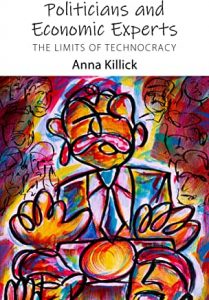Anna Killick’s book Politicians and Economic Experts: The Limits of Technocracy makes for interesting reading, if you’re an economist interested in policy. The book summarises a research project based on interviews with politicians engaged (currently or in the recent past) in economic policy issues, in five countries: Denmark, France, German, UK and US. My main takeaway from the book is that politicians on average have low respect for economists – albeit for varying reasons depending on their country and ideology. For example, some see economists as political commentators, a comment made about someone like Paul Krugman in the US. Others despair more generally about the lack of consensus in economic advice. One quoted comment is that there have been no new big ideas in economics since Keynes, and no substantive progress, unlike medicine. Many comments complain about economists’ inability either to communicate effectively or to appreciate political constraints (the latter being something I’ve written about – if the outcome of an economic analysis simply can’t be implemented, the analysis is at best incomplete.)
The book concludes: “The most powerful insight into politicians that this study offers is their unease about any further ceding of power to economic experts…. they have been shaken by the populist manifestations of the past five years; Brexit, Trump, the rise of the AfD, the RN and the yellow vests. They have only one choice: to re-engage with voters on economic issues, in a contested form, in the political domain.” I agree that previously technocratic areas of policy are becoming unavoidably areas of political contestation.
So why a paradox? Because the language and concepts of economics still hold such powerful sway in many areas of policy – a case Elizabeth Popp Berman makes for the US, or debate about ‘the Treasury View’ in the UK. And indeed I would argue strongly for the importance of technocratic input into decisions concerning complex areas, with better communication, and a sensitivity to the political dimensions. There’s also a lot of interesting detail in the book – the distinctiveness of the French, the much greater polarisation of the Americans, the identity of the economists or schools of thought different politicians cite.

